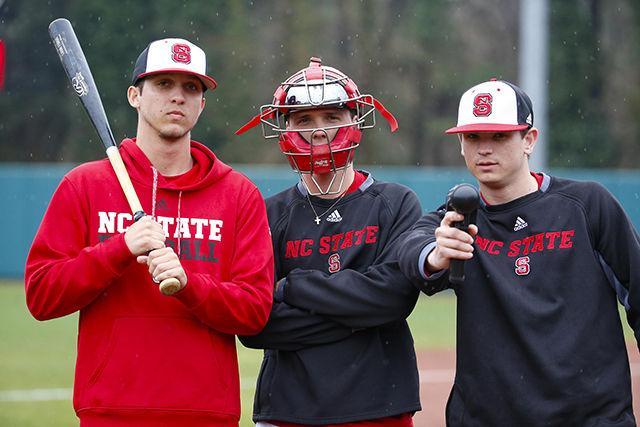 Dalton Greco, a junior studying sports management, Kyle May, a junior studying business administration, and Trey Baker, a senior studying communication, managers for the baseball team, pose for a picture on the baseball field." />
Dalton Greco, a junior studying sports management, Kyle May, a junior studying business administration, and Trey Baker, a senior studying communication, managers for the baseball team, pose for a picture on the baseball field." />
Contributed: Twitter
Dalton Greco, a junior studying sports management, Kyle May, a junior studying business administration, and Trey Baker, a senior studying communication, managers for the baseball team, pose for a picture on the baseball field.
When you get your first win of the season against a top-25 opponent in an out-of-town tournament, sometimes the only logical thing to do is take a polar plunge.
For the managers Kyle May, Trey Baker, Dalton Greco and Bobby Austin of the NC State baseball team, it’s a moment to unwind following all the hard work they put in before and during the game, and to pay off a Twitter bet.
“Trey was the one who put it out there from our Twitter account that if we got 200 retweets that we’d jump in the ocean,” May said following the team’s win against Coastal Carolina. “But it’s all to make us closer as a team and to have fun.”
Greco added that a social media presence is good for the team in terms of expanding the fan base and getting people more invested.
“We are doing this more so to get more awareness to the Twitter page and to get more people hyped up for the team,” Greco said.
The managers have a long list of jobs that they do with the team. Some of the jobs included are setting up the fences for batting practice, shagging balls in the outfield and helping set up the infield for home games.
In addition to their main duties, they also have rather unusual jobs, whether it be holding up a whiteboard for the coaches during a team meeting or even shoveling up ice before practice.
“It’s all about what the head coach wants from us at that time,” Baker said.
For the managers, getting a hold of the job was a relatively easy process to go through, especially for Baker and May.
“I got an email from my adviser telling me about the job, then I talked to Michael Salamino, director of operations for the team,” Baker said. “He asked me how much I knew about baseball, and then that’s how I got to be one of the managers.”
While Baker talked to Salamino, May talked to the head coach himself.
“For me, I talked to Coach Avent, and he asked me ‘Are you here to play or here for a job?’ and I just told him that my body hurts way too much for me to be playing sports,” said May, a junior studying business administration. “So they set me up to catch balls in the bullpen for our relievers.”
According to the managers, the time commitment is tremendous, especially when they take trips for series away from Doak Field with the team.
“It’s a lot of time,” Baker said. “I go to school, do my school work and then I go to the field and work seven to eight hours a day. After that, I go home and do homework until it’s time for me to go to bed and do it again the next day.”
Add in the trips that teams go on, and it can be particularly strenuous for the managers.
“We honestly work well-over 40 hours a week, but we don’t get paid hourly to be there,” Greco said. “When we go on trips, it’s essentially overtime.”
Baseball games are notorious for taking a very long time to finish, especially in a high-scoring affairs like the 13-10 win against Coastal Carolina. Long-lasting games can often leave managers with plenty of time on their hands and looking for something to do.
“Normally I’ll go and buy a burger when I’m waiting in the stands and working the radar gun,” Baker said. “For me, it’s just about talking with the people.”
As for what he does in the bullpen during the game, May tries to make the time go by and work on different pitches in addition to catching balls for the relief pitchers warming up.
“When I’m out there, I just work on my pitches,” May said jokingly. “Sometimes Bobby will get mad at me for throwing pitches like fastballs and off-speed stuff, and I just tell him ‘Bobby, if they call my number, I’m going in.’”
While they are an integral part of the baseball team, they are also students without the benefit of being on scholarship like some of the athletes that attend NC State.
“It is very tough; I actually have a paper due tonight,” said Baker, a senior studying communication. “It does get a bit challenging for us sometimes, but the coaches and staff are very supportive of us.”
The biggest misconception that the managers see from their friends is the stereotype that all that matters is getting the gear from the team, to which the group says there is so much more to it than that.
“I always tell people that it’s not an easy job,” Greco said, “But if you do the job right, it can be a really fun job.”